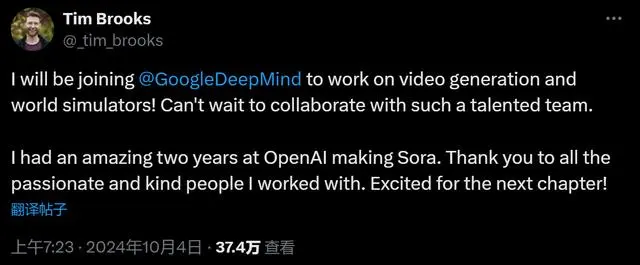recent,OpenAI of Sora Tim Brooks, the research lead for the video generation system, announced on social media that he will be joining the Google DeepMind, continues to work on video generation and world simulators.
Brooks said he is excited to be working with such a talented team at DeepMind, and is grateful for the two great years he spent at OpenAI, especially on the Sora project.

Sora has garnered a lot of attention since its release in February and has put pressure on its competitors. brooks' move is seen as part of Google's expansion of its capabilities in the field of AI video generation. deepMind CEO Demis Hassabis warmly welcomed brooks on board and hinted at the company's larger goals, citing the longtime dream of a "world simulator" that would be the first of its kind in the world. "A world simulator," a long-held dream.
Brooks' departure is certainly a blow for OpenAI, as Sora was seen as an important step towards generalizing artificial intelligence (AGI), and OpenAI's claim that Sora was not only capable of generating stunning videos, but also of simulating and understanding the physical world, has sparked some controversy in the industry.
That said, Google has yet to make a breakthrough in video AI comparable to Sora, but the company has been working on a number of video AI and vision projects such as Project Astra, Veo, Imagen Video, and Phenaki. Meanwhile, OpenAI is also working on an improved version of Sora, with the goal of generating longer, higher-quality videos and at a faster rate, though there's no specific release date yet.
Since the release of Sora, competition in the video AI market has rapidly intensified, especially with new products debuting from China, while U.S.-based companies such as Luma AI, RunwayML, and Pika continue to push the industry forward with model updates.